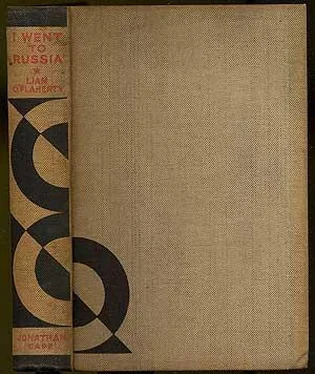Liam O'Flaherty - I Went to Russia
Здесь есть возможность читать онлайн «Liam O'Flaherty - I Went to Russia» весь текст электронной книги совершенно бесплатно (целиком полную версию без сокращений). В некоторых случаях можно слушать аудио, скачать через торрент в формате fb2 и присутствует краткое содержание. Город: London, Год выпуска: 2011, ISBN: 2011, Издательство: Bloomsbury Publishing, Жанр: Публицистика, на английском языке. Описание произведения, (предисловие) а так же отзывы посетителей доступны на портале библиотеки ЛибКат.
- Название:I Went to Russia
- Автор:
- Издательство:Bloomsbury Publishing
- Жанр:
- Год:2011
- Город:London
- ISBN:9781448205592
- Рейтинг книги:5 / 5. Голосов: 1
-
Избранное:Добавить в избранное
- Отзывы:
-
Ваша оценка:
- 100
- 1
- 2
- 3
- 4
- 5
I Went to Russia: краткое содержание, описание и аннотация
Предлагаем к чтению аннотацию, описание, краткое содержание или предисловие (зависит от того, что написал сам автор книги «I Went to Russia»). Если вы не нашли необходимую информацию о книге — напишите в комментариях, мы постараемся отыскать её.
I Went to Russia — читать онлайн бесплатно полную книгу (весь текст) целиком
Ниже представлен текст книги, разбитый по страницам. Система сохранения места последней прочитанной страницы, позволяет с удобством читать онлайн бесплатно книгу «I Went to Russia», без необходимости каждый раз заново искать на чём Вы остановились. Поставьте закладку, и сможете в любой момент перейти на страницу, на которой закончили чтение.
Интервал:
Закладка:
Chapter V. A Discourse On Various Subjects
The first evening that we were in port, the crew behaved in a human fashion. They prowled about the town looking for drink and women. But the Norwegian women were unappetising. The solitary local harlot did not trouble to offer herself to the Bolsheviks, possibly because she knew they had little money to purchase her wares and because she had a professional hatred of Bolshevism. It has always struck me as curious that stock-brokers, clergymen and harlots, the most naked tribes of parasites within our social organism, are the most bitter enemies of Bolshevism and the most ardent supporters of Christian morality.
The supply of drink was less than the supply of women. There was local prohibition at Odda. The wretched natives were subjected to that form of puritanism which has made certain regions of the United States of America the laughing stock of the civilised world. The result of this puritanism was that numbers of the citizens of Odda got most foully drunk every evening on methylated spirits and other dangerous liquors. There were hordes of touts going about, trying to sell these poisons to the poor. As in the United States, the rich could drink as formerly in the security of their homes. It was only the poor who were poisoned.
But the healthy stomachs of the Bolsheviks turned from these poisons, just as their healthy lusts failed to be roused by the Norwegian women. They all came aboard the ship cursing Norway and blaming capitalism for the lack of recreation in Odda.
This helped the captain in his fanatical ambition to make the ship’s stay in port a means of ‘liquidating’ the Norwegian bourgeoisie. I doubt if his men would have consented to go on excursions of observation and propaganda so readily had the town offered facilities for sensual pleasures, or even if they had the money to purchase such pleasures as existed. Indeed, the rage of these people against bourgeois pleasures was largely the result of envy and not a desire to restore man to his aboriginal innocence. They used to tell me how they longed to turn a machine-gun on the crowds issuing from and entering the Savoy Hotel in London. Why? Simply because they themselves could not enter.
So they went like schoolboys in charge of a master on the following day to inspect an electrical plant in the vicinity. The doctor invited me to accompany them but I refused. In common with most civilised people I hate being taken on a tour of inspection with a crowd. But the Russians love such things. They fear solitude. They love being in a mass.
That Sunday I found life on board the ship exceedingly interesting. I met a Norwegian customs officer walking along the deck and we began to talk. He had been a sailor and spoke English very well indeed. He was of fine physique, intelligent above the ordinary, of kindly disposition, a sturdy, trustworthy fellow. We became intimate almost at once, after the manner of men who are accustomed to wander about the world. I was rather astonished when he told me that he was a member of the Norwegian Communist Party. I expressed my astonishment and he asked me the reason.
‘It is hard to explain,’ I said. ‘I suppose it is the difference between you and the Russian Communists aboard this ship that I find odd. I doubt if any of us Western Europeans take Communism really seriously as a religion. Among us a man is either a Conservative, or a Liberal, or a Social Democrat, or a Communist. He is not either a Christian or a Communist.’
He did not understand me and said so in his slow, polite, Norwegian manner.
‘Well!’ I said. ‘My opinion is that Communism is a religion rather than a political belief. It is even a particular form of religious belief as Jesuitism is a particular form of Christianity. A Jesuit may even be a Social Democrat. I have met such people. But Jesuitical Social Democrats would run Social Democratic States on the same autocratic principle as they run their own Society and such governments as they have controlled. They have a particular philosophy of life, bound in dogma, which they insist on imposing on human beings. They will impose that philosophy, irrespective of what outward mask it wears. So with the Bolsheviks. They are a very limited oligarchy, with a philosophy of life that appeals in its entirety only to very few people. The masses controlled by them have very little to do with . . . Yes. I quite understand I am not making myself very plain. But to put it quite baldly, I believe the Russian Bolsheviks are fanatics, with a dogma they want to impose on the world. You don’t look like a fanatic. You rather look like a Liberal, a Social Democrat.’
Straightway, the man became furious.
‘I a Social Democrat!’ he cried. ‘I hate them, the Social traitors.’
Then he began to mouth about topical quarrels among the various parties that espouse the cause of the proletariat. Nothing is so dreary as these quarrels. They rival in intensity and bitterness the quarrels among the early followers of Jesus Christ. In common with nearly all European Communists and Socialists, he had no comprehension of his objective, being almost solely concerned with proving that all factions except his own were wrong in their tactics and their beliefs. His Communism was something similar to a hobby that occupied his spare time and the fact that he may have been willing to go to jail for it was no proof that it was more than a hobby. Among us, irascible characters are quite willing to go to jail in defence of their theories about the cuckoo’s egg. I grant that there are Communists and Socialists among us who are inspired by the ambition to achieve fame or political success within our societies; but there are hardly any who have the ambition definitely to overthrow capitalism and ruthlessly organise Socialism on its ruins.
‘You are a Communist,’ I said, ‘simply because you believe the Social Democrats are wrong and not because you want to create a Communist system of society in Norway.’
He gaped at me and said:
‘Communism must replace capitalism or else Europe will revert to barbarism.’
‘That is possible,’ I said. ‘But I feel that you don’t really believe communism is going to replace capitalism in Norway.’
‘It is difficult to say,’ he answered. ‘It is hard to move the Norwegian people. Conditions are too good for the workers. When conditions are better in Soviet Russia than in Norway, then perhaps there will be a revolution here.’
‘Then your idea of a Norwegian revolution is not of a dynamic force, a spiritual renaissance, but a cold, mercenary exchange by calculating mobs of one system of economy for another; just as a man changes a barren cow for a fertile heifer.’
‘You are a bourgeois intellectual’ he said. ‘It is easy to argue but there are only two classes and between them there is . . .’
‘War to the extermination of one,’ I said. ‘I know all that, just as I know about the Immaculate Conception and the Infallibility of the Pope and other honoured dogmas. But tell me honestly. Do you really believe you are a Communist like these Russians?’
‘I am a Norwegian Communist,’ he said after some thought. ‘The Russians are big children. They make many mistakes. On this ship things are not done well.’
‘Ah!’ I said. ‘You admit a difference, if only a difference in degree of civilisation. But the truth is that you are not a Communist but a Social Reformer. You want to improve Norwegian life not to uproot it. The Russians on the contrary are trying to create a new order of society and to give a new philosophy of life to the world. You are as remote as the poles, you and the Russians. Your attitude towards them is a purely selfish one. I am not talking of you personally but of European Communists in general. You are content to watch the Russians expending their energies, fighting, starving, struggling against great odds? to make a revolution in the organisation of human society, knowing that you will gain immensely if they succeed and yet lose little of your present status if they fail. You are a Communist because you are more intelligent and ambitious than the other workers and you want to be a favourite of the Russians in their hour of triumph. Instead of attempting revolution yourself you wait for the Russians to do the job for you. I am amazed at the folly of the Russians in expecting any help from you; unless, indeed, they are subtle enough to regard their foreign Communist organisations as espionage groups and as means of demoralising European economy while their own economy is being organised. But I have an idea that when the Russians are strong enough they are going to get tired of maintaining you. They are going to treat you in the same way as they’ll treat the Social Democrats and the bourgeoisie and the proletariat too; by planting a Russian empire on your backs.’
Читать дальшеИнтервал:
Закладка:
Похожие книги на «I Went to Russia»
Представляем Вашему вниманию похожие книги на «I Went to Russia» списком для выбора. Мы отобрали схожую по названию и смыслу литературу в надежде предоставить читателям больше вариантов отыскать новые, интересные, ещё непрочитанные произведения.
Обсуждение, отзывы о книге «I Went to Russia» и просто собственные мнения читателей. Оставьте ваши комментарии, напишите, что Вы думаете о произведении, его смысле или главных героях. Укажите что конкретно понравилось, а что нет, и почему Вы так считаете.












